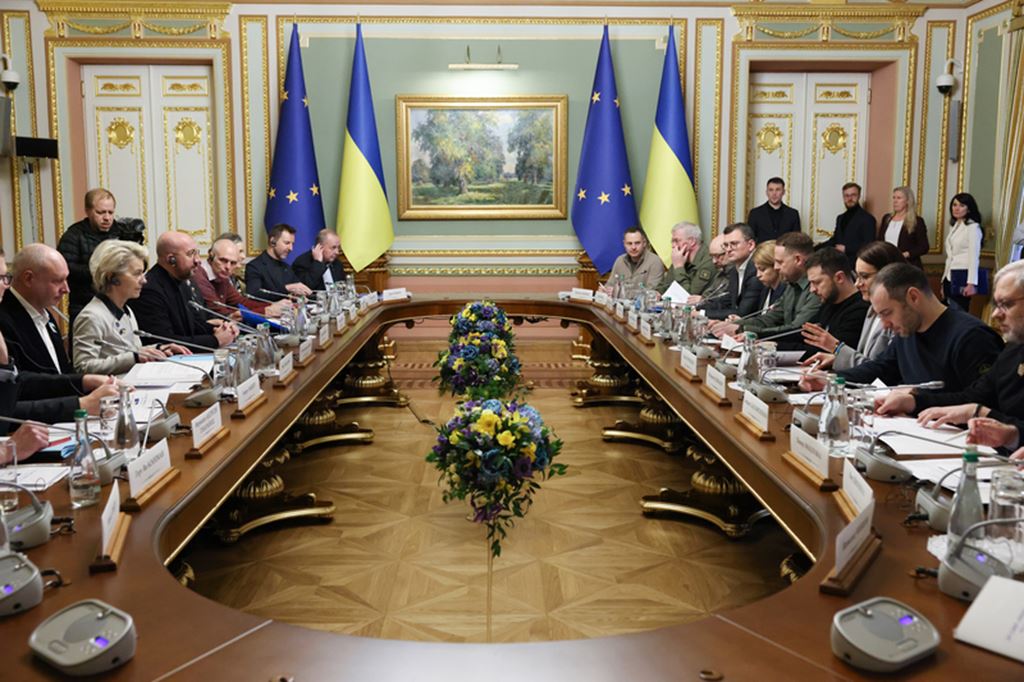The first EU-Ukraine summit since Russia’s invasion of Ukraine took place on Friday in Kyiv directly after a meeting between the College of Commissioners and the Ukrainian government on the previous day.
The summit was held in the same format as the one in 2021 and included the President of the European Council, Charles Michel, the President of the European Commission, Ursula von der Leyen, and the President of Ukraine, Volodymyr Zelensky. Heads of state or government from EU member states were absent.
The leaders discussed among others Ukraine’s accession process, EU’s response to Russia’s war against Ukraine, initiatives for a just peace and accountability, cooperation on issues of reconstruction and relief, and global food security. The joint statement at the end of the summit reiterated and clarified the announcements from the meeting with the College and announced more support to Ukraine.
The statement was agreed by the Committee of Permanent Representatives (Coreper, made up of heads or deputy heads of missions of the member states to the EU), negotiated with Ukraine and then confirmed by Committee again, which means that all 27 member states were involved in the preparations.
“The EU will be with you and your people tomorrow and for as long as it takes,” said President Michel. “We will be right by your side to rebuild a modern, prosperous Ukraine firmly anchored on our common European path.”
As previously reported, the Commission will report on the fulfilment of the conditions specified in the Commission’s opinion on Ukraine’s membership application as part of its regular enlargement package in 2023. The Commission will also provide an update in Spring 2023 which will be conveyed to Ukraine the appropriate channels.
When the Commission presented its opinion in June 2022 on granting Ukraine candidate status, Commission president von der Leyen was aware of that not everything can be accomplished in the middle of a war but was optimistic that many of the reform steps are doable despite the war.
She asserted last year that Ukraine in the last eight years has gradually moved closer to the EU and already adopted or implemented 70 % of the acquis and 80 % of the recommendations on rule of law issues.
At the meeting on Friday, von der Leyen handed-over the Commission’s so-called analytical report, complementing its opinion on Ukraine's EU membership application. This report takes stock of the situation in June 2022 and does not include any updated information about the development since then if the substance of the chapter was covered in the Commission opinion.
It would have been good news if the she could have announced that Ukraine had made measurable progress despite the ongoing war. In the joint statement, the EU acknowledged “the considerable efforts that Ukraine demonstrated in the recent months towards meeting the objectives underpinning its candidate status for EU membership and welcomed Ukraine’s reform efforts in such difficult times.”
While Ukraine might have passed new laws and built institutional capacity to comply with the EU acquis, it is almost an unsurmountable challenge to implement the reforms in the middle of a relentless and brutal war. EU is requiring a proven track-record from other candidate countries and seems unwilling to agree to a fast-track accession process for Ukraine despite the emergency situation.
The joint statement is unequivocal in condemning Russia’s “escalating war of aggression against Ukraine” and reaffirmed “EU’s unwavering support for and solidarity with Ukraine”.
“As in the case of Crimea and Sevastopol, the European Union will never recognise as lawful any attempted illegal annexations of any parts of Ukrainian territory. We demand that Russia immediately, completely, and unconditionally withdraw all of its military forces from the entire territory of Ukraine within its internationally recognized borders.”
“Ukraine is exercising its inherent right of self-defense against the Russian aggression,” the statement says. “It has the right to liberate and regain full control of all occupied territories within its internationally recognized borders.”
The EU reiterated its readiness to support Ukraine’s initiative for a just peace based on respect for Ukraine's sovereignty and territorial integrity. “To date, Russia has not shown any genuine willingness regarding a fair and sustainable peace.”
The EU expressed also its support to the 10-point peace plan which was presented by President Zelensky in November last year and supports the idea of a Peace Formula Summit aiming at launching its implementation. Unfortunately, Russia has rejected the plan and appears to be planning for a new military offensive against Ukraine.
The peace plan includes both confidence building measures which could be implemented in the context of a cease-fire and a permanent solution of the territorial issues based on restoring Ukraine's territorial integrity. One of the points in the plan is the prevention of ecocide and the need for protecting the environment which has been severely damaged and contaminated during the war.
M. Apelblat
The Brussels Times

